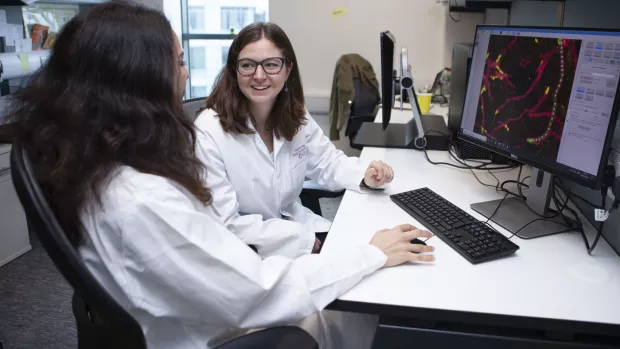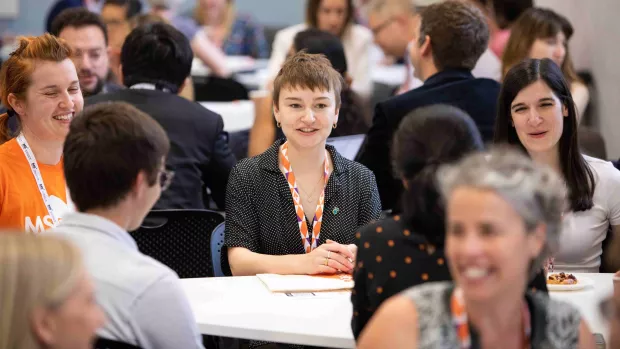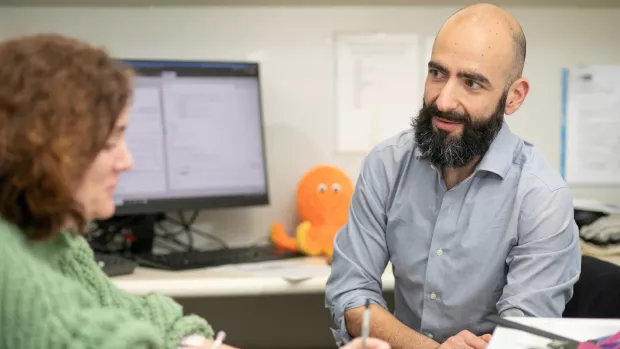
Supporting your career development
We offer a range of training and career development opportunities to support your professional development as an independent MS researcher.
You can find further information, including dates and deadlines, under each opportunity.
Training and resources
Our ECR Assessment Framework outlines the skills and training we look for if you apply to our Early Career Fellowships. You don't need to demonstrate every item in the Framework. But you should think about what you can evidence in your application. And where there are gaps in your skillset, don't ignore them. Instead, tell us how you're working to gain those skills or experience.
In this webinar, we discussed our funding opportunities and what you need to do to make your application as competitive as possible when applying to us. We covered our different award types, making sure your application is in remit, our Research Strategy and patient and public involvement.
Watch the webinar recording on Youtube
Read more about our research awards
In this webinar, we hosted a conversation with Professor Sue Pavitt and Professor Patrick Lewis, Chairs of our Career Development Award and Catalyst Award rounds. We spoke about what happens once you’ve submitted your application, what our review panels are looking for in an application and common reasons why applications may not get funded.
Watch the webinar recording on Youtube
Current opportunities
MS Frontiers will be held at the University of Liverpool on Thursday 4 and Friday 5 July 2024. In the afternoon on Wednesday 3 July 2024 there'll also be an event for early career researchers.
In 2022, we hosted an ECR breakfast session talking about top tips for a career in academia. For 2024, we have a half-day event! We're working on the program and will share this as soon as possible.
Registration for MS Frontiers is now open. Register for the conference through Eventbrite. And let us know if you're coming to the ECR event!
You can also submit your abstract for oral or poster presentation. Abstract submission closes at 12 noon on Friday 1 March 2024. Submit your abstract through Microsoft Forms.
Deadline for applications: 12.00 noon on Friday 22 March 2024.
We’re inviting you to observe our Catalyst Awards Round 2 Review Panel meeting, which is being held virtually on Thursday 18 April 2024. We hope this gives you insight into our grant review process.
- You don't need to be funded by us to apply. But you do need to be based in the UK.
- We'll consider applications from final year PhD students through to junior PIs (inclusive of the clinical equivalents)
- You can't apply for this opportunity if you're involved in any capacity in an application to our 2024 Catalyst Awards Round 1.
We're committed to supporting researchers from diverse backgrounds and experiences. So we particularly encourage applications from groups underrepresented at senior academic levels, including women and those from diverse ethnic backgrounds.
Apply to observe our 2024 Catalyst Awards Review Panel meeting through Microsoft Forms.
Upcoming events and opportunities
This will be offered again in March 2024 when Early Career Fellowship applications open.
We offered researchers applying to our Early Career Fellowships additional support with their PPI plans. The ECR PPI Partnership (previously known as 'Application Development') paired ECRs with people affected by MS from our Research Network. The researchers worked with the PPI representatives to develop their ideas, lay summary and PPI plans before submitting their application.
This will be offered again in March 2024 when our Catalyst Awards, PhD Fellowships and Early Career Fellowships open for applications.
If you’re applying for our funding, you need to:
-
write a clear lay summary
-
outline your involvement plans for your research
Your application is reviewed by people affected by MS alongside experts in your field. Our funding panels also include researchers without direct expertise in your area of research. If your lay summary is too brief or too complex, it’ll be difficult for them to comment on and score your application. And this will affect whether it might be funded.
Our Lay Summary Development scheme can help you. Members of our Research Network can give feedback on your lay summary and involvement plans before you submit.
Past events and opportunities
We gave you the opportunity to co-Chair parallel sessions at MS Frontiers in July 2024. Successful applicants will chair the live session with a co-Chair from the Frontiers Scientific Committee. They'll also help select abstracts for presentation and co-design the parallel session format.
This opportunity may be offered again in 2026.
We invited PhD students and post-docs researching MS to enter our first ever blog competition. We asked you to tell us why your research matters to someone affected by MS. This opportunity has now closed.
The winner’s blog will be published in our quarterly MS Matters magazine. And the runners up will be featured on our website. We’ll announce the winner in March and their article will be published in the summer edition of MS Matters in June.
In November 2023, we invited PhD Fellows to our London office for a day of networking, talks and workshops. We spoke about patient and public involvement (PPI), developing independence and communicating research to a non-specialist audience. We also had a talk from one of our Early Career Fellows about their journey to an MS Society Early Career Fellowship.
We'll run this workshop again in 2024.
In this workshop, we discussed the value of communicating well with patients and the public. We spoke about getting to know the needs of your audience and building an understandable research story. We also covered writing in plain English, accessibility, and using social media.
We’re pleased to have recruited several Early Career Researchers to join the Scientific Steering Committee for MS Frontiers 2024. This opportunity will be offered again in 2025.


